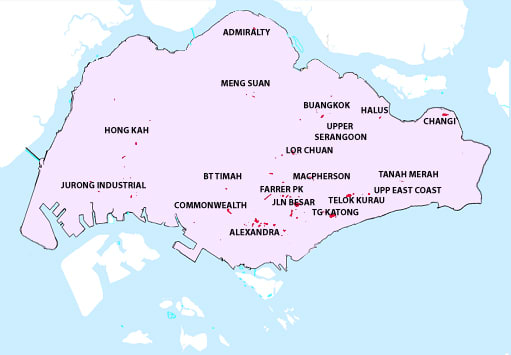Are You Safe From Monsoon Damage?
Winter monsoon season brings sporadic temperatures, substantial winds and an increased risk of flooding. The heavy rainfall, which is steadily increasing poses many challenges for those who are unprepared. With this in mind, Singapore's government instituted policies to curb the effects of monsoon season, from regulating construction to building dams. This has substantially reduced the amount of damage incurred by residents. However, you might still wonder how safe you and your property are from monsoon weather. To answer that, here are some things to think about when considering your safety from flood damage.
Is Your Neighbourhood Monsoon-Safe?
Some neighborhoods are more affected than others from monsoons. For example, the hardest hit places tend to be in the south of Singapore. This is due to the south being closer to sea level and at lower altitude than the rest of the nation. If your neighborhood is more flood prone, there are some things you can consider doing to protect yourself. For instance, you can sign up for Singapore's National Water Agency's SMS alerts to know when heavy rain is expected.
Areas Prone To Higher Flooding in Singapore

If you are currently in the market to buy a home and are concerned about flooding, consider how different neighborhoods are affected by floods. For instance, data suggests that the most flood prone areas in Singapore are Hong Kah, Jurong West, Queenstown, Alexandra and Jalan Mat Jambol. On the other hand, Hong Kah and Meng Suan are the least prone to flooding. While floods won't necessarily affect a flat above ground, flooding can make it difficult and dangerous to get around. Prior to buying a home, you should check with the real estate agent to obtain a flooding history record to see whether the property suffered from flood damage.
How Can You Protect Your Home and Belongings?
Flooding in Singapore has damaged over 550 homes and cost Singaporeans USD $23.8 million since 2000. So, whether you live in a Housing Development Board (HDB) or private house, it's always good to know whether your flat is monsoon-proof. While most HDB properties are built to be flood resistant, some materials are more effective than others in preventing monsoon floods. From a construction standpoint, walls and ceilings with brick, concrete, stone or pressure-treated materials can better withstand monsoon conditions more than wood. Moreover, since flooding primarily results in damaged floors, concrete, ceramic, clay terrazzo and pressure-treated rubber are ideal for resisting water.
Singapore's National Water Agency suggests that those who live or work in places closer to sea-level (ie, the Central Business District, which is less than 5-metres below sea level) should install flood boards or have sandbags on standby. You can insulate by sealing up any cracks in your foundation, install flood sensors, and make sure electrical panels are not on the ground. If your home does flood, there are several water extraction and dehumidifying services available.
How Can You Protect Your Vehicles?
Apart from your home, you might be worried about your car, motorcycle, or other electric vehicle. A good practice is to service your car, which costs S$188 on average every six months. The servicers will check that your vehicle has had an anti-rust coating within the year, the tyres are not worn, and all the lights are working properly. By doing so, you're making sure your car will be in better condition to withstand the tumultuous weather.
If you find yourself driving during a monsoon, there are steps you can take to mitigate the damage done to your car. For instance you should stay in low gear and avoid accelerating and de-accelerating quickly, as that might put water in your engine. If you car hydroplanes, meaning it starts sliding uncontrollably, steer in an open direction.
If your car or motorcycle was damaged due to a monsoon, you must call your insurer within 24 hours or by the next working day. Your car or motorcycle insurance should be able to cover the costs of the damage. If the damage is minor, however, you can try fixing it yourself by turning off the car, disconnecting the battery ground strap, and examining where the flooding is prevalent.
While the Risk of Severe Damage is Low, Preparation is Key
While monsoons and flash floods may not destroy your property any time soon, significant damage can occur if you do not take the proper precautions. To avoid this, you can upgrade some weather-proof fixtures, renovate your home and make sure your home insurance adequately covers the full cost of your renovations and contents.
Monsoons are a recurring feature of the weather in Singapore and Southeast Asia more generally, but the unpredictability of rainfall, drought, rising sea levels and higher global temperatures are part of the larger issue of climate change. Proofing your home and property against potential weather disasters could assist you in the long-run with other climate-related disasters .

